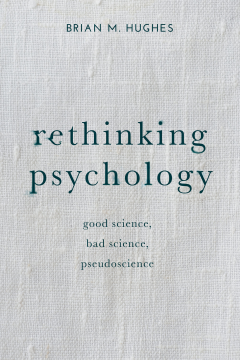
Additional Information
Book Details
Abstract
Balancing readability with intellectual rigour, this is an essential guide to the complex relationship between psychology, science, and pseudoscience. Unique in its focus on the philosophy of science within psychology, it critiques controversial practices and challenges the biases which threaten academic rigour within the field.
Psychology is one of the most popular subjects in universities across the world, offering unique insights into the human condition. However, its very popularity threatens to undermine its value as a discipline, and it often attracts those who lack scientific rigour.
Taking a fresh look at common practices and pitfalls, Brian Hughes examines the relationship between psychology, science and pseudoscience, and explores the biases impeding some psychologists from being truly rigorous.
Brian Hughes is Professor of Psychology at the National University of Ireland, Galway. He has held visiting academic appointments at the Universities of Missouri, Leiden, and Birmingham, and at King's College London. His research focuses on psychological stress and its impact on health, and on psychosocial moderators of stress processes. He also writes widely on the psychology of empiricism and of empirically disputable claims, especially as they pertain to science, health, and medicine. He holds Ph.D. and B.A. degrees from the National University of Ireland, and an Ed.M. degree from the State University of New York at Buffalo.
Brian Hughes has written an important and engaging book exploring the relationships between science, pseudoscience, and psychology. He argues persuasively that psychology itself can properly be considered to be a true science but one that is marred within by pockets of pseudoscience. This book should be read by anyone with a serious interest in the subject.' – Professor Christopher French, Goldsmiths, University of London
'Hughes provides a timely and comprehensive reminder of the critical role of science in both academic and professional applications of psychology. It covers an impressive breadth of topics with incisive clarity and illustrates clearly the integral role of scientific approaches to understanding psychological phenomena.' – Dr David Hevey, Trinity College Dublin
Table of Contents
| Section Title | Page | Action | Price |
|---|---|---|---|
| Cover | Cove | ||
| Contents | v | ||
| Acknowledgements | vi | ||
| Preface | vii | ||
| Part I – Psychology and Pseudoscience in Theory | 1 | ||
| Chapter 1 – What Is Science and Why Is It Useful? | 3 | ||
| Chapter 2 – What Is Pseudoscience and Why Is It Popular? | 23 | ||
| Chapter 3 – The Scientific Nature of Psychology | 47 | ||
| Chapter 4 – The Psychology of Evidentiary Reasoning | 69 | ||
| Part II – Psychology and Pseudoscience in Practice | 101 | ||
| Chapter 5 – Examples from the Fringes: From Healing the Mind to Reading the Body | 103 | ||
| Chapter 6 – Examples from the Mainstream: Biological Reductionism as Worldview | 130 | ||
| Chapter 7 – Examples from the Mainstream: What Some People Say about What They Think They Think | 154 | ||
| Part III – Psychology and Pseudoscience in Context | 179 | ||
| Chapter 8 – Biases and Subjectivism in Psychology | 181 | ||
| Chapter 9 – Religion, Optimism, and Their Place in Psychology | 205 | ||
| Chapter 10 – Psychologists at the Threshold: Why Should We Care? | 240 | ||
| References | 256 | ||
| Index | 280 |
